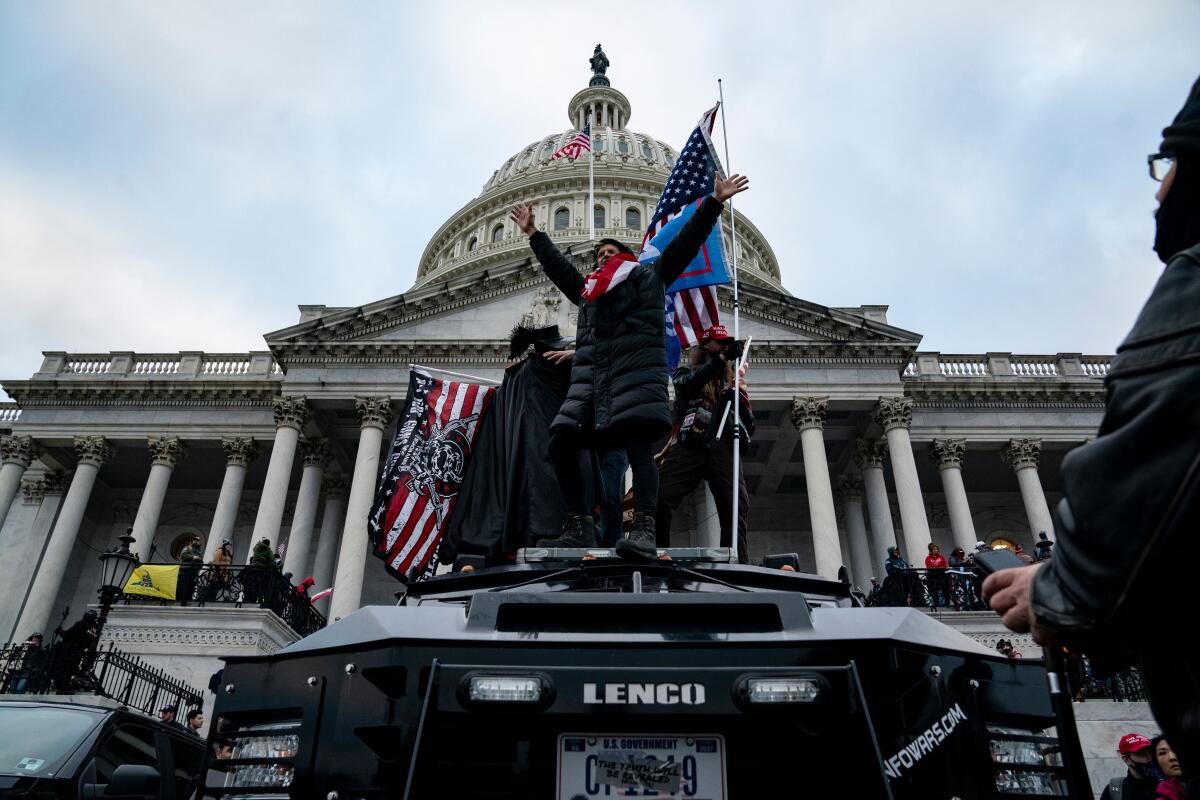Newsletter: Trump went full despot on Day 1, pardoning Jan. 6 rioters

- Share via
Good morning. It is Saturday, Jan. 25. Sadly, more fires have erupted around L.A. since last weekend; find The Times’ latest coverage of them here. Now, let’s look back at the week in Opinion.
In the moment, it’s hard to know when history happens. The word “historic” was thrown around a lot this week to describe the inauguration of the new president. Arguably, almost any action by a person of such immense consequence could rate a mention in history books, so it’s a bit of a cliché to say a president did something historic.
But even presidents can outdo themselves. To me, the moment that felt truly historic came later on Inauguration Day, when President Trump endorsed political violence in his service by pardoning 1,583 people convicted in connection with the Jan. 6 insurrection. That’s the kind of era-defining inflection point you’d rather read about instead of experience, and if the president’s party didn’t control both houses of Congress, we’d hear rumblings for an impeachment inquiry. (For those inclined to quibble over the Constitution’s definition of an impeachable offense, click here for a paper on the Framers’ understanding of “high crimes and misdemeanors.”)
Beyond that, as columnist Jackie Calmes noted, the blanket pardon broke Trump’s own promise to the rioters on Jan. 6, 2021: “To those who broke the law, you will pay.” It also contradicted the previous statements by Vice President JD Vance and Atty. Gen.-designate Pam Bondi that the pardons would be decided on a case-by-case basis, showing that A) Trump, as before, lacks any of the loyalty to his subordinates that he demands of them, and B) the president probably told people around him one thing before, on a whim, doing the opposite, also breaking a promise to them.
I’m in the group, along with Sen. John Fetterman (D-Pa.), that cautions against freaking out over everything Trump says in favor of doing something about the egregious things he does. I shook my head a lot this week over the president’s executive orders and shockingly inappropriate inaugural address (powerfully dissected here by columnist Robin Abcarian), but much of that falls into Steve Bannon’s “flood the zone” strategy. Some of it is already being held up in court.
But the power to pardon, abused by former President Biden on his way out the door, borders on monarchical in this constitutional republic. Trump wielded it in the most despotic fashion ever, releasing people who assaulted police officers and put the lives of members of Congress (and the journalists covering them) at risk. What a first day at the Oval Office.
How governable is Los Angeles? Joel Kotkin unfavorably compares the city of 3.8 million neighbors to much smaller working-class suburbs such as Lakewood, Paramount and Downey. There, he says, leaders stay hyper-focused on basics such as infrastructure and public safety. The Palisades fire response puts renewed attention on L.A. City Hall’s management of essential services, which Kotkin implies may have fallen by the wayside in favor of splashier issues such as climate change and opposing Trump.
Before rebuilding, we should recognize the fires’ tragedies and opportunities. “What now?” — it’s a question that evinces the priorities of whoever’s answering. Several writers — a wildfire survivor, economists, city planners, a political scientist and an activist — look at the destruction in Pacific Palisades and Altadena and take stock of what people lost and where these communities may be headed.
Enjoying this newsletter? Consider subscribing to the Los Angeles Times
Your support helps us deliver the news that matters most. Become a subscriber.
The challenge now is deciding how to rebuild safely in areas destroyed by fire. Eventually we’ll have to do something with all this torched land; The Times’ editorial board says the people in affected communities will lead the way, but those who rebuild will have to do so differently than before. That doesn’t mean abandoning their neighborhoods, but rather “creating fire breaks and buffer zones to offer some barrier between developments and wild land. It means building with more fire-resilient materials and ember-resistant vents.”
Experts once thought highly of Biden’s presidency. His legacy is likely to change. Based on his first three years in office, Biden was ranked in the top third of American presidents in a survey of scholars. So much has happened since then, write political scientists Brandon Rottinghaus and Justin Vaughn: “Future assessments will have to incorporate new information not only about his deterioration but also the extent to which he and his staff kept it hidden, the administration’s ineffectual handling of the war in Gaza, the president’s low standing with the American people at the conclusion of his term and the precarious situation in which he leaves his party.”
More from opinion
From our columnists
- Jackie Calmes: Biden delivered a new “Roaring ’20s.” Watch Trump try to take the credit
- Jonah Goldberg: Donald Trump is president again. Did you feel the vibe shift?
- Robin Abcarian: The Palisades fire took their classroom. Their teacher is trying to give it back to them
From guest contributors
- What California’s response to Trump’s threatened mass deportations is missing
- Los Angeles and the literature of the apocalypse
- It’s time to relearn the lessons of Thomas Paine’s “Common Sense”
From the editorial board
- After the fires, must we get rid of our flammable eucalyptus and palm trees? Maybe not
Letters to the editor
- After the fires, we need to talk about L.A.’s absentee landowners
- Edison’s remarkably self-serving statements on the Eaton fire’s origin
- Why can’t I get my concrete fire-resistant home insured?
Stay in touch.
Enjoying this newsletter? Consider subscribing to our other newsletters and to The Times.
As always, you can share your feedback by emailing me at [email protected].
A cure for the common opinion
Get thought-provoking perspectives with our weekly newsletter.
You may occasionally receive promotional content from the Los Angeles Times.




